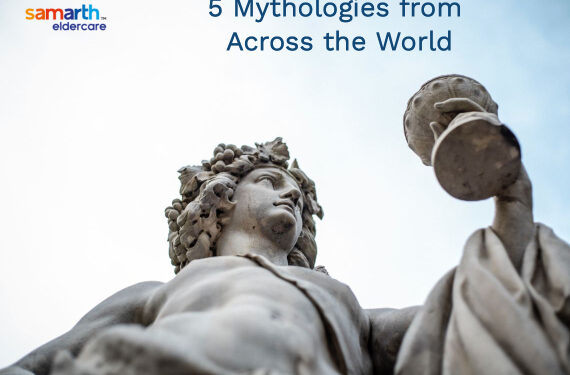When it comes to mythology, Indians are highly interested. We all might have read the Hindu mythologies Ramayana, Mahabharata, etc. These stories fueled our imagination at a time when there was no TV, mobiles, or the Internet. Many of us had some favourite granny mythological stories that took us to yonder worlds. In those days, Amar Chitra Katha was a famous comic that gave wings to our reading. These mythological stories are very popular globally and have been the base for many discussions, adaptations, and artistic creations. However, there are a few other mythologies that are equally popular across the world, let’s take a quick look at them:
- Greek mythology
Greek mythology is popular across the world due to its many references in literature. It is quite expansive and has many gods and goddesses, war tales, etc. It has influenced many writers, artists, and Greek culture a lot. It is said Homer’s poems Iliad and Odyssey shaped and popularized many of the Greek gods. Some of the popular names from Greek mythology are Zeus, Poseidon, Apollo, Aphrodite, Hera, Athena, and Atlas. Some popular Greek stories are Hercules, The Trojan Horse, and Achilles. The latter two are used as common English phrases to indicate the situations of those stories.
If one takes a closer look, then it is easy to find many similarities between the ancient and rich mythologies of India and Greece. For example, Lord Krishna and Achilles, both heroes of their respective mythologies, and near immortal, but both succumbed to arrows striking their heels.

Join Now >
Yama and Hades are both the lords of death and preside over the underworld. They decide the fate of all those who enter their realm, and also have a hound (Sharvara and Cerebrus respectively) who guard the gates of the underworld. The stories of Arjuna and Achilles perhaps hold the most striking of similarities. Arjuna and Achilles were both skilled, yet reluctant, warriors. In the Kurukshetra war, Arjun was not too enthused about fighting, and the same can be said of Achilles in the Trojan war. Both men also lose someone very dear to them. Arjuna lost his son Abhimanyu, Achilles lost his cousin Patroclus, and both pledged to avenge their deaths.
- Norse mythology
For starters, you probably have heard about Thor, a very popular Marvel character. He is the Norse God of Thunder with his hammer and was the son of Odin, known as the father of all gods. Norse mythology belongs to the Viking age of Scandinavia and contains stories of wars between two main groups of Norse gods, namely, the Æsir and the Vanir. Odin belonged to the Æsir clan, and it is said Wednesday was derived from his name, while Friday came from his wife’s name, Frigg, the goddess of the sky. The Norse world consisted of nine universes, and Asgard is where Odin ruled. This mythology also described monsters and dwarfs and talked about Ragnarok as the time when people fight, die and a new world order begins.
- Egyptian Mythology
Egyptian mythology is vast and intriguing, much like this ancient civilization filled with tales of kings, queens, and gods. Their gods came in human or animal forms or a mix of both, as they saw divinity in everything around them. Even their kings were considered to be descendants of gods. Their main god is Ra, the sun god Ra of Heliopolis. According to their myth, he travels across the sky during the day and to the underworld at night. Ra is part of the Egyptian creation myth as the first God who emerged from nothing. It is said humans came from his tears. One popular story details how Osiris, another ruling god, was killed by his brother and thrown into the Nile. Nile floods because his wife, Isis, wept for weeks. Osiris’s son Horus avenges his father and takes over the kingdom after he grows up. Osiris becomes the first Egyptian mummy, created by Anubis, who came to be called the God of the mummies.
- Chinese mythology
This mythology got passed across generations orally for over a thousand years and is part of Chinese folklore. It got recorded in two books, namely Shui Jing Zhu and Shan Hai Jing. There are some interesting Gods and rulers in this mythology. The Dragon King, for example, is the God of all waters, weathers, and dragons. Nuwa is their oldest deity, worshipped as the great mother. The three religions, Confucianism, Buddhism, and Taoism have had a role to play in shaping Chinese mythology and culture. The ancient Chinese worshipped the natural forces like the earth, sun, rain, clouds, mountains, rivers, etc. Two central characters of Chinese mythology are The Three Sovereigns and the Five Emperors.
- Roman mythology
Roman mythology has similarities with Greek mythology as these civilizations were close to each other. Their main gods and goddesses were Jupiter, Juno, and Minerva. Interestingly, Juno was Jupiter’s wife and sister. Venus is a very popular Roman goddess of love, and Neptune is the sea god. Pluto is the god of the underworld, Mars is the god of war, and Fortuna is the goddess of luck. By now, you might have guessed that our planets are named after these Roman gods and goddesses. The January month is named after another Roman god Janus, and so are March (Mars), May(Maia), and June (Juno). Rome’s national epic, The Aeneid, by Virgil, drew from various Roman myths. Another poet Ovid, based his creations Fasti, and Metamorphoses, also on these myths.
This article only covers a brief about these mythologies in this article and each of these is quite expansive and fascinating to explore in-depth. You may also find many similarities among these that may be astounding as well.






